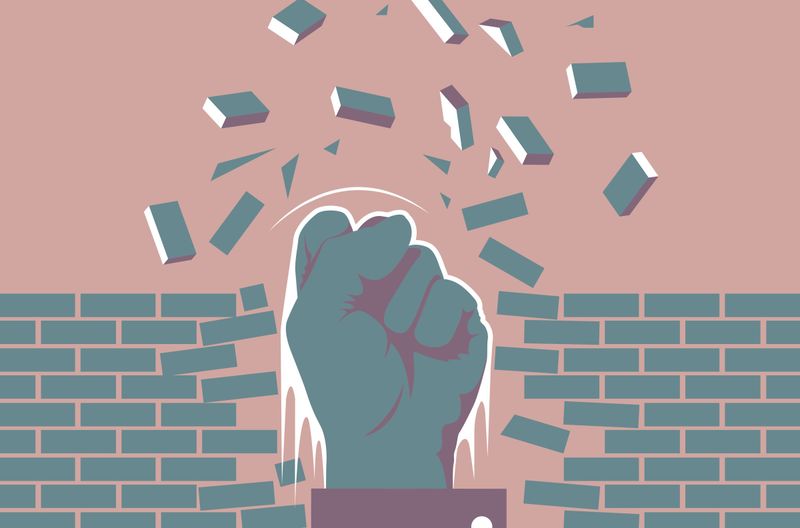18 Signs You Might Be Carrying More Anger Than You Realize
Anger doesn’t always show up as shouting matches or slammed doors. Sometimes, it simmers quietly beneath the surface, disguised as exhaustion, sarcasm, or even silence.
If you’ve been feeling “off” without knowing why, it might be time to look a little closer. In this revealing article, we’ll explore 18 surprising signs that you could be carrying more anger than you realize.
Recognizing these hidden emotions isn’t about blaming yourself—it’s about empowering yourself to heal, grow, and find healthier ways to cope.
Awareness is the first step toward freedom, and you deserve a life that feels lighter, not heavier. Let’s unpack what’s been weighing you down—and start setting it free.
1. Chronic Irritation

Ever feel like everything is getting on your nerves? From the sound of the neighbor mowing the lawn at 9 AM to your partner’s habit of leaving dishes in the sink, it’s like the universe is conspiring against your peace. I know the feeling, and it’s exhausting.
This chronic irritation often signals that you’re holding onto more anger than you think. Maybe it’s not about the dishes at all. Perhaps it’s pent-up frustration from unmet expectations or unresolved conflicts lingering in the background.
Recognizing this pattern is crucial. It’s the emotional equivalent of a flashing warning light on your dashboard. Addressing the underlying issues can lighten this emotional load, making everyday annoyances feel more manageable. So, next time you feel that familiar irritation creep in, pause and ask yourself: what’s really bothering me? It might be more than just the surface irritant. You deserve peace, truly.
2. Unexpected Tears

Tears rolling down your cheeks during a commercial about dog food? Been there. Sometimes, emotions catch us off guard, pouring out when we least expect them. It’s not just the sad movie or the touching song; it’s your body’s way of saying, “Hey, pay attention!”
For many of us, crying can be a surprising outlet for suppressed anger. Maybe you’ve been conditioned to bottle things up, or perhaps you’re just so used to keeping the peace that your feelings have nowhere else to go.
Next time you find yourself tearing up over something that seems trivial, take a moment to check in with yourself. What’s really behind those tears? It might just be anger dressed up as sadness. Letting yourself feel, even if it’s messy, is the first step to finding clarity. Remember, shedding tears is not a sign of weakness; it’s a sign you’re alive.
3. Replaying Past Arguments

Ever found yourself revisiting an argument from years ago, thinking about all the things you could’ve said? It’s like being stuck in a loop, playing a mental game of “what if.” This habit of mind is more than just a quirk; it’s a signpost pointing to unresolved anger.
When arguments replay in your mind, it’s often because they left a mark on your soul. Unfinished business and unexpressed feelings have a way of hanging around, demanding your attention even when you’re not consciously aware of it.
To break free from this cycle, try acknowledging the emotions connected to these memories. Write them down, talk to a friend, or even speak to a therapist. Give yourself permission to feel and express those bottled-up emotions, and watch how it frees up your mental space. It’s time to make peace with the past, one memory at a time.
4. Avoiding Confrontation

Do you find yourself steering clear of confrontations like they’re the plague, only to feel resentful afterwards? It’s a common strategy—keeping the peace at all costs—but it’s a double-edged sword.
On the outside, everything seems calm, but inside, there’s a storm brewing. When we avoid addressing issues head-on, we inadvertently give our anger more power. It festers, turning into resentment, which can eat away at our happiness over time.
So, what can we do? Start small. Practice voicing your feelings in low-stakes situations. The more you do it, the easier it becomes. Remember, confrontation doesn’t have to be explosive. It can be a gentle expression of your needs and boundaries. And hey, who knows? You might just find that speaking up can be incredibly freeing. Letting go of that resentment can make room for more joy and connection in your life.
5. Snapping at Loved Ones

We’ve all been there: snapping at a loved one over something insignificant, then feeling that pang of guilt afterwards. Those closest to us often bear the brunt of our unexpressed anger because they’re safe spaces, albeit unintentionally.
But why does this happen? It’s easier to let out frustration at those who love us unconditionally because we know they won’t abandon us. Yet, this cycle isn’t healthy for anyone involved. It can strain relationships and leave us feeling even more isolated.
To change this pattern, acknowledge when you’re on edge and identify the real source of your frustration. Communicate openly with your loved ones about your feelings and work together to find solutions. It’s okay to need help managing emotions. Embracing vulnerability within these relationships can strengthen your bond and create a more supportive environment where you both can thrive.
6. Trouble Sleeping

You’re exhausted but sleep eludes you, leaving you to toss and turn when all you want is rest. This insomnia can be a subtle hint that your mind is wrestling with unspoken emotions, particularly anger.
When we suppress feelings, they don’t disappear; they linger in the corners of our consciousness. At night, when distractions fade, these emotions come out to play, keeping you up as your mind replays the day’s grievances or unresolved issues.
To reclaim your sleep, try journaling before bed to process these emotions. Write down what’s on your mind, and see if any patterns emerge. Sometimes, just acknowledging what’s bothering you can alleviate its hold. And remember, it’s okay to seek support if you need it. Sleep is a vital part of self-care, and you deserve to rest peacefully. So, tuck those thoughts away and let yourself drift into dreamland.
7. Masking Feelings with Humor

Ever notice how humor can sometimes be a shield, a way to deflect from what’s really going on inside? Cracking jokes when you’re actually hurting is a common coping mechanism. It’s a sneaky way anger shows up, hiding behind laughter.
Humor can be a double-edged sword. On one hand, it lifts spirits; on the other, it can prevent genuine connection. When we mask our true feelings, we deny ourselves the chance to be understood and supported.
Next time you find yourself resorting to humor, pause and reflect on what you’re truly feeling. Opening up to trusted friends or journaling can help you process these emotions more constructively. Remember, it’s okay to be vulnerable. Sharing your authentic self, even if it feels scary, can lead to deeper connections and a more genuine sense of happiness. It’s time to let your guard down and invite healing in.
8. Feeling Emotionally Numb

You’re sitting there, surrounded by life, yet everything feels muted. No highs, no lows—just a constant state of numbness. When your emotions are on overload, sometimes your mind hits the pause button as a way to cope.
This emotional shutdown is often mistaken for apathy, but underneath it lies a reservoir of unprocessed anger. It’s your mind’s way of saying, “We’re too full right now.” Acknowledging this pattern is the first step towards re-engaging with your emotions.
To reconnect, start by allowing yourself to feel in small doses. Engage in activities that used to bring joy and notice the sensations. Gradually, you’ll find that the numbness begins to fade, replaced by a more vibrant emotional landscape. Remember, it’s okay to seek help if you need it. You deserve to feel alive and connected to yourself and the world around you.
9. Triggers by Authority

Ever notice how being told what to do by someone in authority makes you bristle? It might seem irrational, but it’s a common reaction for those carrying unaddressed anger. It’s like your emotions are on alert, ready to protect you from perceived threats.
These triggers aren’t just about the present moment; they’re often echoes of past experiences where your autonomy was stifled or your voice silenced. Recognizing this pattern can help you understand the unresolved issues fueling this reaction.
To manage these feelings, practice grounding techniques like deep breathing when you feel triggered. Reflect on past experiences that may be influencing your reactions. Over time, you can learn to respond with calm and clarity, rather than reflexive defensiveness. It’s about reclaiming your power and finding a voice that’s both assertive and respectful. You’ve got this, one step at a time.
10. Holding Grudges

Grudges are like badges of honor for some. Holding onto them can feel empowering, like a way to assert control over past hurts. Yet, they can also be chains, anchoring you to pain that’s begging to be released.
When we hold grudges, it’s often because we want acknowledgment for the hurt we’ve endured. But here’s the catch: the only person who suffers is you. The emotional toll of carrying these burdens can be immense, impacting your happiness and well-being.
Consider this: forgiveness doesn’t mean forgetting; it means freeing yourself from the grip of the past. Reflect on what you’re holding onto and why. Allow yourself the freedom to let go, and experience the lightness that follows. It’s not easy, but it’s worth it. You deserve to live unburdened by the weight of yesterday’s grievances. Take a breath, and set yourself free.
11. Defensiveness in Calm Conversations

Ever find yourself getting defensive in conversations that aren’t even heated? It’s like your emotional armor is always up, ready for battle, even when there’s no war to fight.
This defensiveness often stems from a place of unrecognized anger. It’s a shield, protecting the sensitive parts of your soul that feel threatened by vulnerability. But remember, not every conversation is a battlefield, and not every comment is a criticism.
To ease this defensiveness, practice active listening and remind yourself that it’s okay to be wrong or misunderstood sometimes. Open dialogue can lead to better understanding and closer connections. Trust in the strength of your relationships and allow yourself to lower your guard. It might feel uncomfortable at first, but it’s a step towards healthier communication and deeper bonds. You’re stronger than you think, and you don’t always have to fight.
12. Need for Solitude

Sometimes, the world feels like it’s closing in, and the only relief comes from being completely alone. It’s as if solitude is the only state where you can truly relax and let your guard down.
When this need for isolation becomes overwhelming, it might be masking deeper feelings of anger. It’s your mind’s way of saying, “I need space to process.” While alone time can be rejuvenating, it’s important to balance it with social connections.
Allow yourself moments of solitude to recharge, but also challenge yourself to engage with others. Share your feelings with someone you trust. Creating a support system can make the world feel less overwhelming and more manageable. After all, you’re not alone on this journey. Embracing connection, even when it feels daunting, can be a powerful antidote to the isolation of unacknowledged emotions.
13. Feeling Misunderstood

Have you ever felt like no one truly gets you, even when you’re surrounded by people? It’s like speaking a different language, where everyone else seems to understand each other except you.
This feeling of being misunderstood often stems from the need to hide anger to maintain harmony. Over time, it can lead to a sense of disconnect, both from others and from yourself. It’s a lonely place to be, and it’s okay to feel that way.
To bridge this gap, start by being honest about your feelings, even if it’s uncomfortable. Share your experiences and perspectives with those around you. You might be surprised at how many people relate to your struggles. Building authentic connections can help dissolve the isolation and bring you closer to understanding both yourself and others. Remember, you deserve to be seen and heard, just as you are.
14. Fantasizing About Cutting People Off

Ever caught yourself daydreaming about a drama-free life, where you cut ties with everyone who doesn’t quite get you? It’s a tempting fantasy, especially when you’re feeling overwhelmed by emotions.
This desire to “cut off” is often a reaction to feeling unheard or unappreciated. It’s a defense mechanism, a way to reclaim control when things feel too chaotic. But while it might seem like a quick fix, it doesn’t address the root of the issue.
Instead of severing ties, consider having open conversations about your needs and boundaries. It’s challenging, but it can lead to healthier relationships and a more fulfilling life. Remember, you have the power to choose who to keep in your circle and who to distance yourself from. You’re in control of your emotional well-being, and you deserve relationships that honor and respect you.
15. Overworking as Distraction

Sometimes, staying busy feels like the best way to avoid emotions we’d rather not face. You dive into work, chores, or endless scrolling, thinking that if you just keep moving, the feelings won’t catch up.
But here’s the truth: overworking is often a distraction from underlying anger. It’s a way to keep the mind occupied, avoiding the discomfort of sitting with emotions that demand attention.
Try this: set aside time each day to be still. Allow your thoughts to surface without judgment. Consider journaling or meditating to process what’s really going on. Acknowledging these feelings can reduce their power over you, leading to more balanced and intentional living. You deserve to live a life where work is fulfilling, not just an escape. Embrace stillness and find peace in the present moment. It’s a journey, but you’re not alone in it.
16. Distrusting Emotional Support

Do you find it hard to trust others with your emotions, opting to carry them alone instead? It’s a common struggle for those who’ve been hurt or let down in the past.
Distrust often stems from unaddressed anger towards those who’ve failed you before. It’s a protective measure, guarding your heart from further disappointment. But remember, carrying this burden alone is exhausting.
Opening up to others, even if it’s just a small step, can be incredibly healing. Start by sharing with someone you trust, or consider speaking with a therapist. It’s okay to ask for help, and you might be surprised at the support waiting for you. Trusting others with your emotions is a leap of faith, but it’s one that can lead to deeper connections and a lighter emotional load. You deserve support, and you don’t have to face this journey alone.
17. Guilt Over Anger

If you’ve ever felt guilty just for being angry, you’re not alone. Many of us have been taught that anger is a negative emotion, something to be ashamed of. But here’s the thing: anger is natural, and it’s okay to feel it.
Guilt over anger often comes from internalized messages that equate anger with bad behavior. But in reality, anger is simply a signal that something needs attention. It’s your mind’s way of alerting you to boundaries that have been crossed or needs that have gone unmet.
Instead of suppressing it, try acknowledging your anger without judgment. Write down what triggered it and explore why it made you feel that way. This practice can help you understand and manage your emotions better. Remember, feeling anger doesn’t make you a bad person. It makes you human. Embrace your emotions and use them as a guide towards personal growth and self-awareness.
18. Pretending to Be Fine

You’re at a gathering, smiling and nodding along, but inside, it’s a different story. The “I’m fine” mask is one we wear to blend in, to keep everything smooth on the surface, even when chaos brews beneath.
Pretending to be fine is a common strategy for those carrying hidden anger. It’s a way to avoid rocking the boat, to prevent further emotional labor. But while it might seem easier, it can lead to feelings of isolation and inauthenticity.
To break free from this pattern, start small. Share a bit of your true feelings with someone you trust. Letting down the mask, even slightly, can open the door to more genuine connections. It’s okay to not be okay all the time. You deserve to be seen for who you truly are, and that begins with accepting your full range of emotions. You’re not alone, and it’s okay to ask for understanding.






